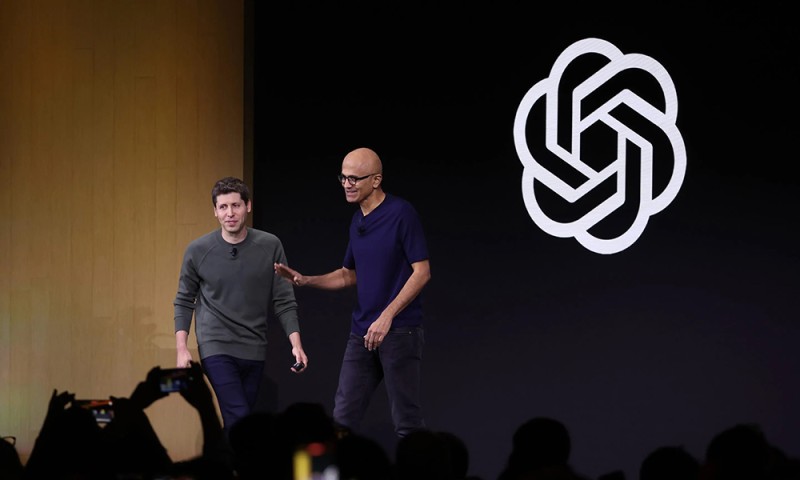
OpenAI如今已是全球最具价值的私营公司,但在2019年微软最初向这家初创企业投资10亿美元时,这远非一笔稳操胜券的交易。
微软首席执行官萨蒂亚·纳德拉(Satya Nadella)在接受专注于科技的YouTube频道TBPN采访时回忆道,他甚至遭到了公司联合创始人兼首任首席执行官比尔·盖茨的反对。
“要记得当时它还是一个非营利组织,我想比尔[盖茨]甚至说过,‘是啊,这10亿美元注定要打水漂',”纳德拉说。
然而,纳德拉和微软团队并未被反对意见动摇。尽管纳德拉指出,由于投资规模巨大,他需要走正规流程并获得董事会批准,但他表示,尽管存在风险,“说服大家认同这是一个重要领域并不那么困难。”
“我们当时算是有点高风险承受能力,我们说,‘我们想去试一试',”他补充道。
2019年,微软将与OpenAI的合作和投资部分视为在AI领域立足并帮助推广Azure人工智能能力的一种方式。然而,纳德拉表示,没人能预料到这笔初始投资所奠定的基础,最终促使微软向OpenAI投入了130亿美元。
“回想起来,谁能想到呢?我投入10亿美元时,可没说过‘哦,这会有百倍回报'这样的话,”他说。
微软发言人拒绝置评。
随着OpenAI重组并给予微软该公司27%的股权(价值约1350亿美元),微软于10月28日周二开始收获其投资回报。微软也放弃了与OpenAI的云服务独家合作,但仍达成一项协议,OpenAI将分阶段购买价值2500亿美元的Azure服务。
尽管最初有所犹豫,但盖茨后来对AI及其在短短几年内的快速发展印象深刻。
在今年2月出席《今夜秀》节目时,这位微软联合创始人告诉主持人吉米·法伦,由于AI的崛起,大多数工作最终将不再需要人工。
“总有些事情我们会留给自己去做,”他说。“但在制造物品、运输货物和种植粮食方面,随着时间的推移,这些问题基本上都将得到解决。”(*)
译者:中慧言-王芳
OpenAI如今已是全球最具价值的私营公司,但在2019年微软最初向这家初创企业投资10亿美元时,这远非一笔稳操胜券的交易。
微软首席执行官萨蒂亚·纳德拉(Satya Nadella)在接受专注于科技的YouTube频道TBPN采访时回忆道,他甚至遭到了公司联合创始人兼首任首席执行官比尔·盖茨的反对。
“要记得当时它还是一个非营利组织,我想比尔[盖茨]甚至说过,‘是啊,这10亿美元注定要打水漂',”纳德拉说。
然而,纳德拉和微软团队并未被反对意见动摇。尽管纳德拉指出,由于投资规模巨大,他需要走正规流程并获得董事会批准,但他表示,尽管存在风险,“说服大家认同这是一个重要领域并不那么困难。”
“我们当时算是有点高风险承受能力,我们说,‘我们想去试一试',”他补充道。
2019年,微软将与OpenAI的合作和投资部分视为在AI领域立足并帮助推广Azure人工智能能力的一种方式。然而,纳德拉表示,没人能预料到这笔初始投资所奠定的基础,最终促使微软向OpenAI投入了130亿美元。
“回想起来,谁能想到呢?我投入10亿美元时,可没说过‘哦,这会有百倍回报'这样的话,”他说。
微软发言人拒绝置评。
随着OpenAI重组并给予微软该公司27%的股权(价值约1350亿美元),微软于10月28日周二开始收获其投资回报。微软也放弃了与OpenAI的云服务独家合作,但仍达成一项协议,OpenAI将分阶段购买价值2500亿美元的Azure服务。
尽管最初有所犹豫,但盖茨后来对AI及其在短短几年内的快速发展印象深刻。
在今年2月出席《今夜秀》节目时,这位微软联合创始人告诉主持人吉米·法伦,由于AI的崛起,大多数工作最终将不再需要人工。
“总有些事情我们会留给自己去做,”他说。“但在制造物品、运输货物和种植粮食方面,随着时间的推移,这些问题基本上都将得到解决。”(*)
译者:中慧言-王芳
OpenAI is now the world's most valuable private company, but when Microsoft originally invested $1 billion in the startup in 2019, it was less than a sure bet.
Microsoft CEO Satya Nadella faced pushback even from the company's cofounder and original CEO, Bill Gates, he recalled during an interview on tech-focused YouTube channel TBPN.
“Remember this was a nonprofit, and I think Bill [Gates] even said, 'Yeah, you're going to burn this billion dollars,'“ Nadella said.
Yet Nadella and the Microsoft team weren't swayed by the pushback. While Nadella noted that he needed to go through the proper channels and get board approval because of the size of the investment, he said that despite the risk, “it was not that hard to convince anyone that this is an important area.”
“We kind of had a little bit of high risk tolerance, and we said, 'We want to go and give this a shot,'“ he added.
In 2019, Microsoft viewed the partnership and investment in OpenAI partly as a way to gain a foothold in AI and to help promote Azure's AI capabilities. However, Nadella said, no one could have predicted the groundwork laid by that first investment, which led Microsoft to eventually pour $13 billion into OpenAI.
“In retrospect, who would have thought? I didn't put in a billion dollars saying, 'Oh yeah, this is going to be a hundred bagger,'“ he said.
A spokesperson for Microsoft declined to comment.
Microsoft started reaping the benefits of its investment Tuesday as OpenAI restructured to give Microsoft a 27% stake in the company, worth about $135 billion. Microsoft also relinquished its cloud exclusivity with OpenAI, but still struck a deal that would see OpenAI buy $250 billion worth of Azure services incrementally.
Despite his initial hesitancy, Gates later found himself impressed by AI and its rapid development over just a few years.
In a February appearance on The Tonight Show, the Microsoft cofounder told host Jimmy Fallon (吉米·法伦) that thanks to the rise of AI, eventually humans won't be needed for most things.
“There will be some things we reserve for ourselves,” he said. “But in terms of making things and moving things and growing food, over time those will be basically solved problems.”

